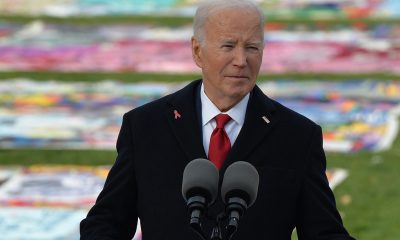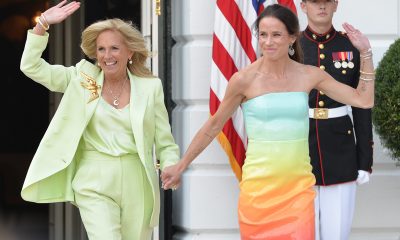National
Soccer star Megan Rapinoe awarded Presidential Medal of Freedom
Rapinoe has championed initiatives to fight for compensation equal to that which is earned by her male counterparts
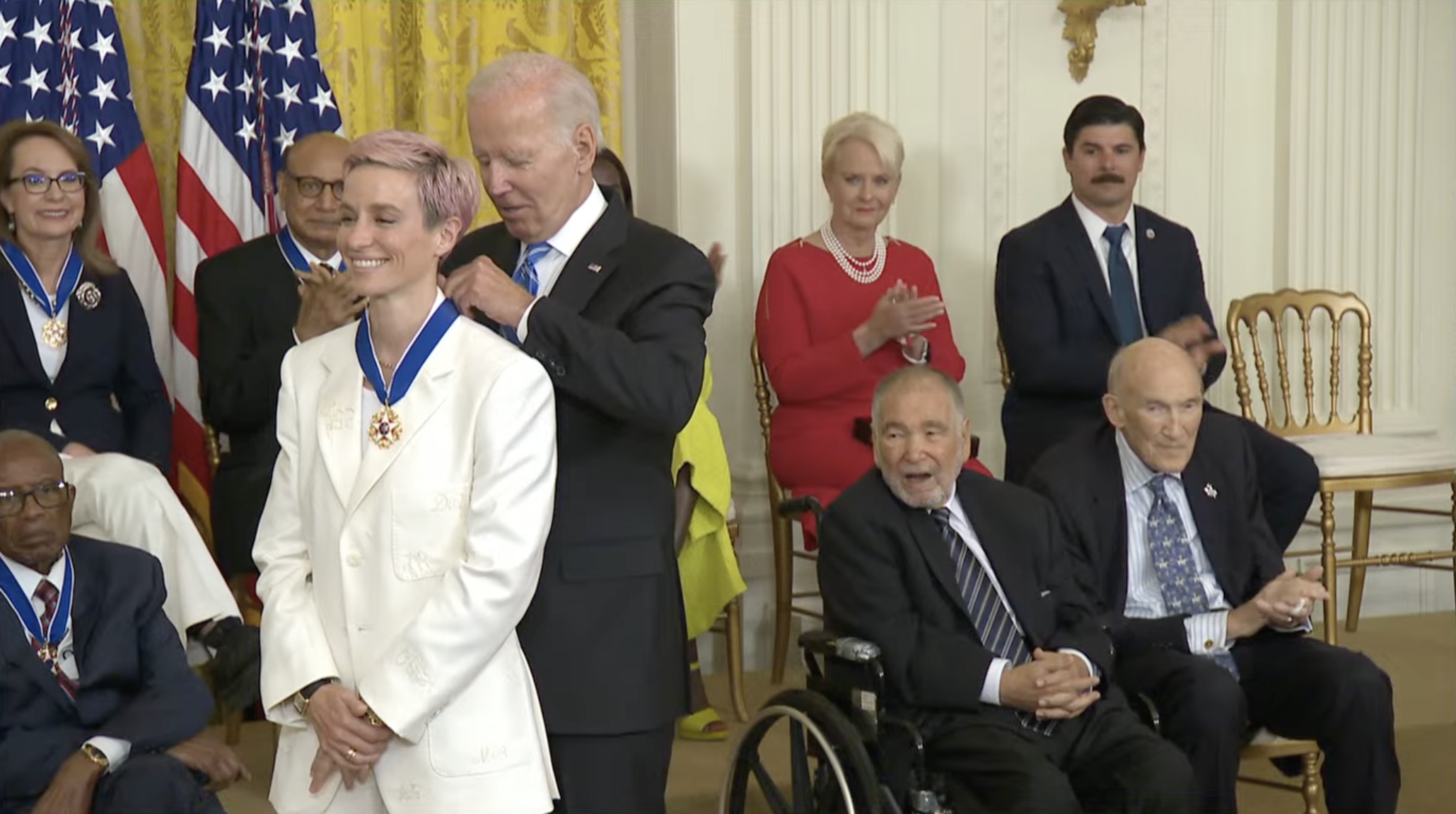
During a ceremony Thursday afternoon in the East Room of the White House, President Joe Biden awarded the Presidential Medal of Freedom to 17 recipients, including lesbian soccer star and activist Megan Rapinoe.
The President opened his remarks with a joke that he hopes Rapinoe and Simone Biles, who is the most decorated gymnast in American history, will find room for the nation’s highest civilian award among the many other medals and trophies they have accumulated throughout their athletic careers.
Biden then praised the women’s leadership off the field and out of the arena in their work championing issues of pay equity and justice for victims of sexual violence, before turning to the lives and accomplishments of the other 15 awardees.
Among them were actor Denzel Washington, former Congresswoman and gun control advocate Gabrielle Giffords, and civil rights pioneers Diane Nash and Raúl Yzaguirre. Posthumous awards were accepted on behalf of the late Apple co-founder Steve Jobs, the late labor activist Richard Trumka, and the late Senator and former Republican presidential nominee John McCain.
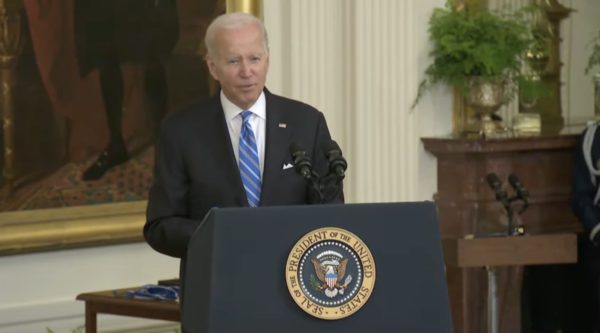
“I never stopped admiring John,” Biden said of his former political rival Senator McCain, “and I never said a negative thing about him in my life.” The remark — which might have been a rebuke to comments made in 2015 by then-presidential candidate Donald Trump in which he called McCain a “loser” and denigrated his record as a war hero — was one of several extemporaneous asides made by Biden about the awardees on Thursday, many of whom he knew personally.
To applause and cheers from the crowd, Biden then medaled each recipient one-by-one as a military aide again summarized their lives, careers, and accomplishments.
About Rapinoe, the military aide said: “A World Cup Champion and Olympic gold medalist who has been named the world’s best women’s soccer player, she leads with a fierce will off the field, too…a champion in protecting the rights of her fellow LGBTQI Americans, and a leader on the US women’s national team — perhaps the most dominant of any team in any sport in their successful fight for equal pay.”
Leading up to and including her tenure as co-captain of the team from 2018 to 2020, Rapinoe has championed initiatives to fight for compensation equal to that which is earned by her male counterparts. On this front, she was involved in a complaint to the Equal Employment Opportunity Commission and lawsuit against the United States Soccer Federation (USSF).
In May, the USSF, the United States Women’s National Team Players Association (USWNTPA), and the United States National Soccer Team Players Association (USNSTPA) struck collective bargaining agreements through 2028 for identical pay for all competitions.
Rapinoe led the US national team to gold medals at the 2012 London Olympic Games as well as in the 2015 and 2019 FIFA Women’s World Cups. Public recognition of her work as an activist began in 2016, when she knelt in solidarity with football quarterback Colin Kaepernick, whose protests on the field against racial injustice and police brutality earned international media attention.
“Being a gay American, I know what it means to look at the flag and not have it protect all of your liberties,” Rapinoe said at the time. “It’s important to have white people stand in support of people of color on this. We don’t need to be the leading voice, of course, but standing in support of them is something that’s really powerful.”
Rapinoe has also distinguished herself as an advocate for LGBTQ+ rights, including through her charitable work with GLSEN.
U.S. Federal Courts
Federal judge scraps trans-inclusive workplace discrimination protections
Ruling appears to contradict US Supreme Court precedent
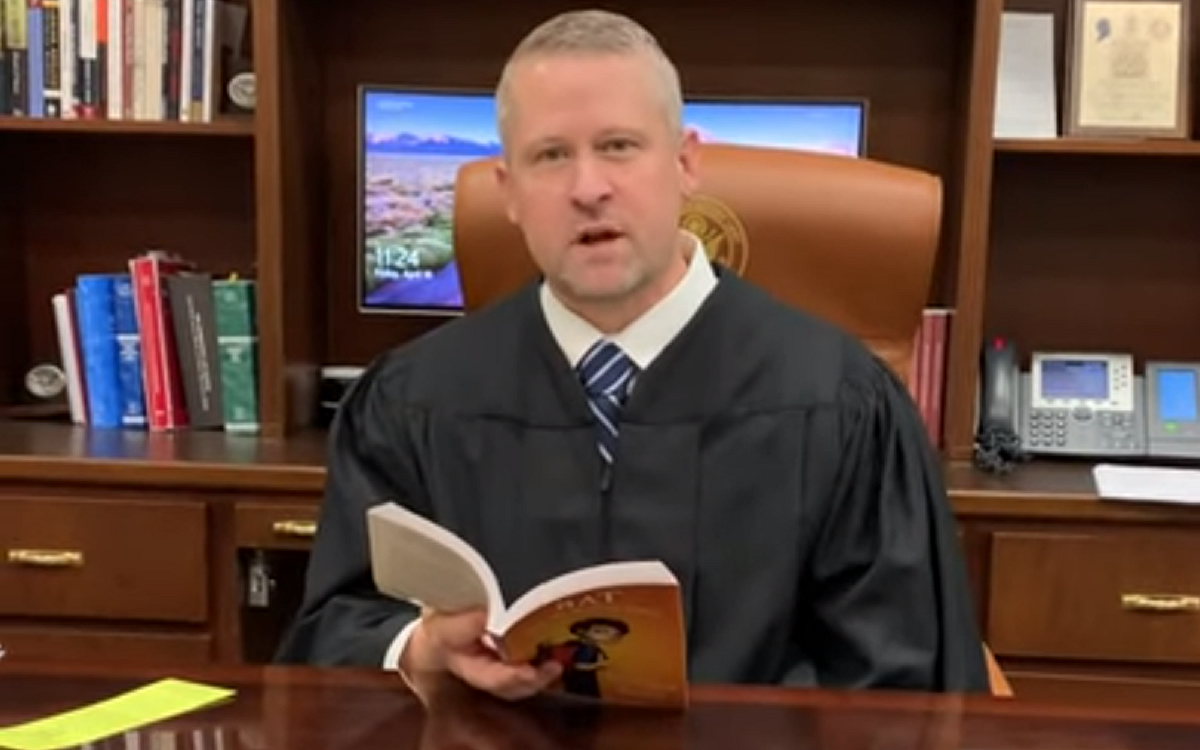
Judge Matthew Kacsmaryk of the U.S. District Court for the Northern District of Texas has struck down guidelines by the U.S. Equal Employment Opportunity Commission designed to protect against workplace harassment based on gender identity and sexual orientation.
The EEOC in April 2024 updated its guidelines to comply with the U.S. Supreme Court’s ruling in Bostock v. Clayton County (2020), which determined that discrimination against transgender people constituted sex-based discrimination as proscribed under Title VII of the Civil Rights Act of 1964.
To ensure compliance with the law, the agency recommended that employers honor their employees’ preferred pronouns while granting them access to bathrooms and allowing them to wear dress code-compliant clothing that aligns with their gender identities.
While the the guidelines are not legally binding, Kacsmaryk ruled that their issuance created “mandatory standards” exceeding the EEOC’s statutory authority that were “inconsistent with the text, history, and tradition of Title VII and recent Supreme Court precedent.”
“Title VII does not require employers or courts to blind themselves to the biological differences between men and women,” he wrote in the opinion.
The case, which was brought by the conservative think tank behind Project 2025, the Heritage Foundation, presents the greatest setback for LGBTQ inclusive workplace protections since President Donald Trump’s issuance of an executive order on the first day of his second term directing U.S. federal agencies to recognize only two genders as determined by birth sex.
Last month, top Democrats from both chambers of Congress reintroduced the Equality Act, which would codify LGBTQ-inclusive protections against discrimination into federal law, covering employment as well as areas like housing and jury service.
The White House
Trump travels to Middle East countries with death penalty for homosexuality
President traveled to Saudi Arabia, Qatar, and United Arab Emirates

Homosexuality remains punishable by death in two of the three Middle East countries that President Donald Trump visited last week.
Saudi Arabia and Qatar are among the handful of countries in which anyone found guilty of engaging in consensual same-sex sexual relations could face the death penalty.
Trump was in Saudi Arabia from May 13-14. He traveled to Qatar on May 14.
“The law prohibited consensual same-sex sexual conduct between men but did not explicitly prohibit same-sex sexual relations between women,” notes the State Department’s 2023 human rights report, referring specifically to Qatar’s criminalization law. “The law was not systematically enforced. A man convicted of having consensual same-sex sexual relations could receive a sentence of seven years in prison. Under sharia, homosexuality was punishable by death; there were no reports of executions for this reason.”
Trump on May 15 arrived in Abu Dhabi, the capital of the United Arab Emirates.
The State Department’s 2023 human rights report notes the “penalty for individuals who engaged in ‘consensual sodomy with a man'” in the country “was a minimum prison sentence of six months if the individual’s partner or guardian filed a complaint.”
“There were no known reports of arrests or prosecutions for consensual same-sex sexual conduct. LGBTQI+ identity, real or perceived, could be deemed an act against ‘decency or public morality,’ but there were no reports during the year of persons prosecuted under these provisions,” reads the report.
The report notes Emirati law also criminalizes “men who dressed as women or entered a place designated for women while ‘disguised’ as a woman.” Anyone found guilty could face up to a year in prison and a fine of up to 10,000 dirhams ($2,722.60.)

Trump returned to the U.S. on May 16.
The White House notes Trump during the trip secured more than $2 trillion “in investment agreements with Middle Eastern nations ($200 billion with the United Arab Emirates, $600 billion with Saudi Arabia, and $1.2 trillion with Qatar) for a more safe and prosperous future.”
Former President Joe Biden traveled to Saudi Arabia in 2022.
Saudi Arabia is scheduled to host the 2034 World Cup. The 2022 World Cup took place in Qatar.
State Department
Rubio mum on Hungary’s Pride ban
Lawmakers on April 30 urged secretary of state to condemn anti-LGBTQ bill, constitutional amendment
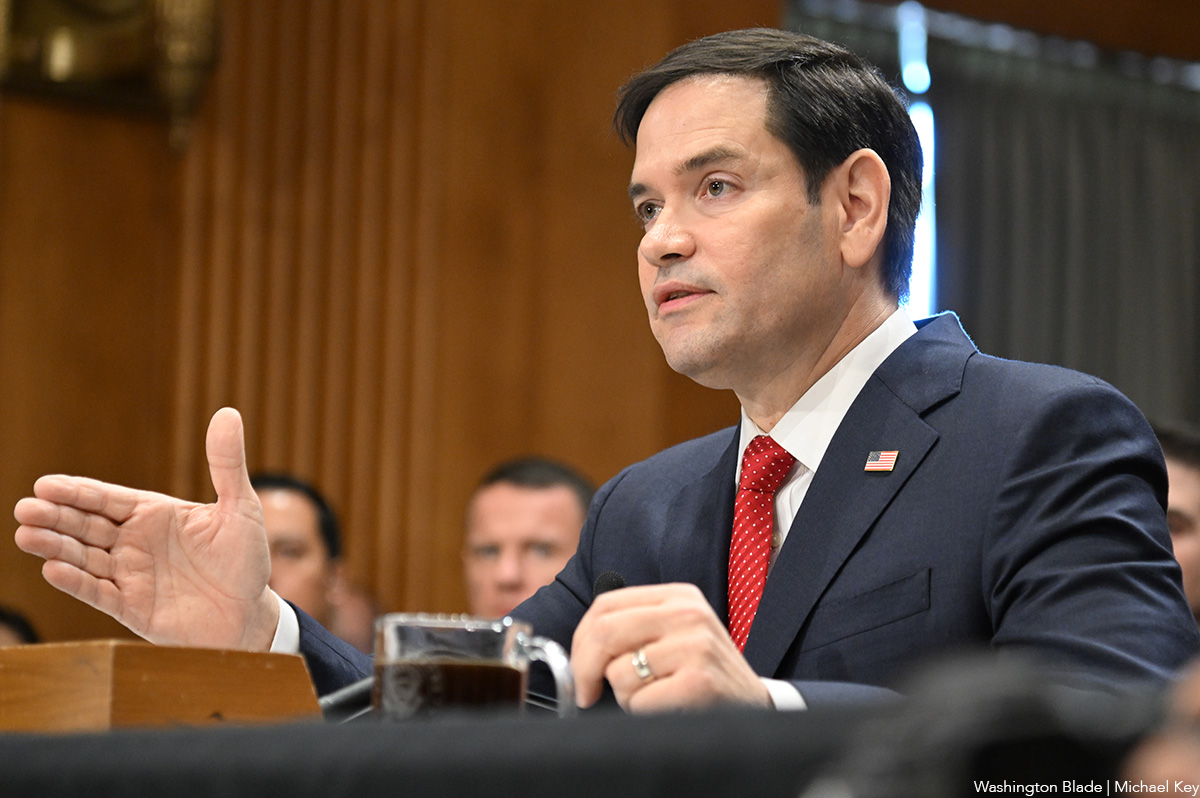
More than 20 members of Congress have urged Secretary of State Marco Rubio to publicly condemn a Hungarian law that bans Pride events.
California Congressman Mark Takano, a Democrat who co-chairs the Congressional Equality Caucus, and U.S. Rep. Bill Keating (D-Mass.), who is the ranking member on the House Foreign Affairs Committee’s Europe Subcommittee, spearheaded the letter that lawmakers sent to Rubio on April 30.
Hungarian lawmakers in March passed a bill that bans Pride events and allow authorities to use facial recognition technology to identify those who participate in them. MPs last month amended the Hungarian constitution to ban public LGBTQ events.
“As a NATO ally which hosts U.S. service members, we expect the Hungarian government to abide by certain values which underpin the historic U.S.-Hungary bilateral relationship,” reads the letter. “Unfortunately, this new legislation and constitutional amendment disproportionately and arbitrarily target sexual and gender minorities.”
Prime Minister Viktor Orbán’s government over the last decade has moved to curtail LGBTQ and intersex rights in Hungary.
A law that bans legal recognition of transgender and intersex people took effect in 2020. Hungarian MPs that year also effectively banned same-sex couples from adopting children and defined marriage in the constitution as between a man and a woman.
An anti-LGBTQ propaganda law took effect in 2021. The European Commission sued Hungary, which is a member of the European Union, over it.
MPs in 2023 approved the “snitch on your gay neighbor” bill that would have allowed Hungarians to anonymously report same-sex couples who are raising children. The Budapest Metropolitan Government Office in 2023 fined Lira Konyv, the country’s second-largest bookstore chain, 12 million forints ($33,733.67), for selling copies of British author Alice Oseman’s “Heartstopper.”
Former U.S. Ambassador to Hungary David Pressman, who is gay, participated in the Budapest Pride march in 2024 and 2023. Pressman was also a vocal critic of Hungary’s anti-LGBTQ crackdown.
“Along with years of democratic backsliding in Hungary, it flies in the face of those values and the passage of this legislation deserves quick and decisive criticism and action in response by the Department of State,” reads the letter, referring to the Pride ban and constitutional amendment against public LGBTQ events. “Therefore, we strongly urge you to publicly condemn this legislation and constitutional change which targets the LGBTQ community and undermines the rights of Hungarians to freedom of expression and peaceful assembly.”
U.S. Reps. Pramila Jayapal (D-Wash.), Sarah McBride (D-Del.), Jim Costa (D-Calif.), James McGovern (D-Mass.), Gerry Connolly (D-Va.), Summer Lee (D-Pa.), Joaquin Castro (D-Texas), Julie Johnson (D-Texas), Ami Bera (D-Calif.), Mark Pocan (D-Wis.), Lloyd Doggett (D-Texas), Becca Balint (D-Vt.), Gabe Amo (D-R.I.), Ted Lieu (D-Calif.), Robert Garcia (D-Calif.), Dina Titus (D-Nev.), Raja Krishnamoorthi (D-Ill.), Jan Schakowsky (D-Ill.) and Mike Quigley (D-Ill.) and Del. Eleanor Holmes Norton (D-D.C.) signed the letter alongside Takano and Keating.
A State Department spokesperson on Wednesday declined to comment.



